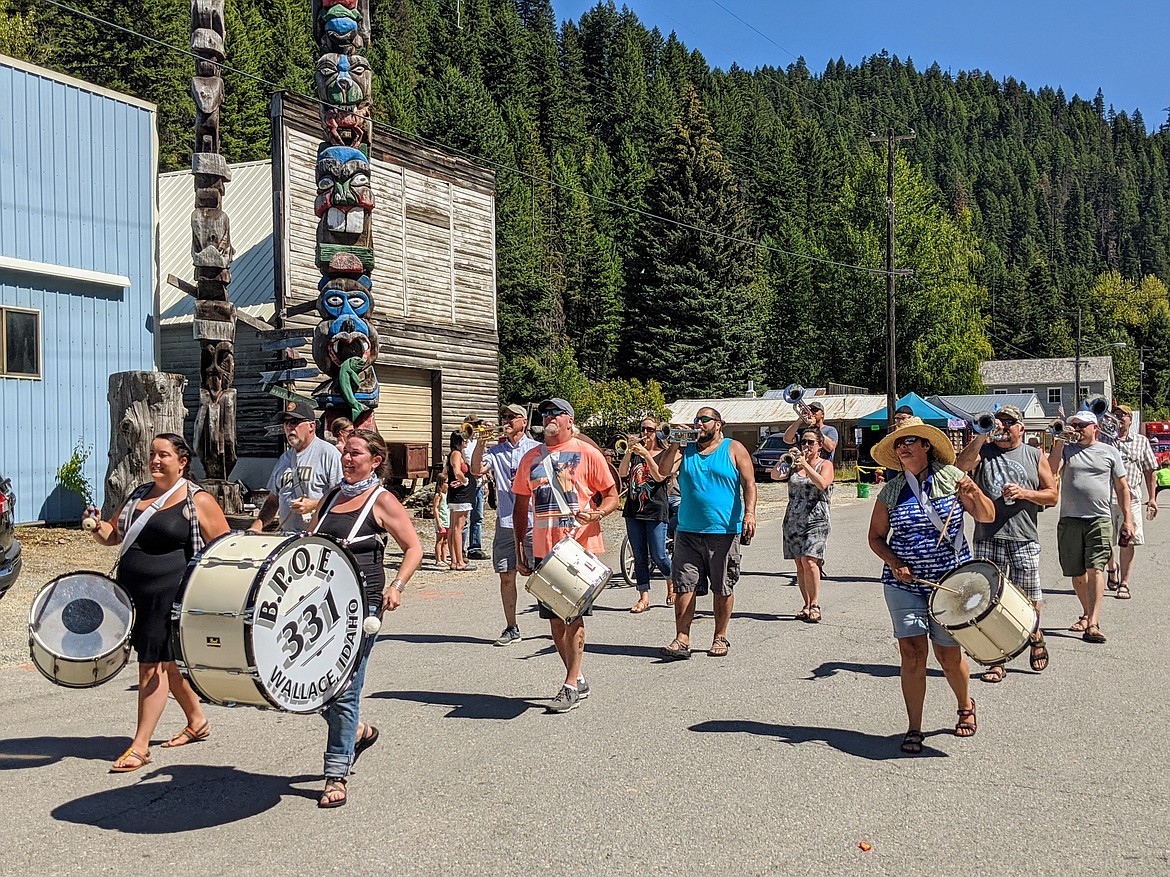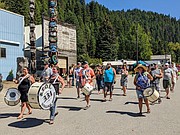I’ll B’Damn
Murray’s Molly B’Damn Days draws a crowd
MURRAY — While most events and festivals have fallen victim to the COVID-19 pandemic, one particular annual event in the backwoods of Shoshone County carried on.
The annual festival honoring Murray’s patron saint, Molly B’Damn (or Maggie Hall), went off without a hitch last weekend as people from all around flocked to the small town to partake in a variety of activities.
While the event technically went from Aug. 14-16, the vast majority of the festivities were held on Saturday.
The day opened up with multiple vendors offering goods down Main Street while helicopter rides were available just outside town. For the younger attendees, a water slide and obstacle course were set up in the city park; along with a mountain man activity station.
Things really kicked off when the parade marched down main street at 1 p.m. that featured many local favorites, such as the Wallace Elks No. 331 Drum and Bugle Corps, local fire/EMS personnel, and Bill Sharp’s veteran float to name a few.
A couple hours later, the tradition of naming a Molly B’Damn Queen continued when Angie Reagan with the Sprag Pole Inn and Museum was awarded the title just outside the Bedroom Goldmine.
The Molly B’Damn Queen candidates, who are sponsored by various local businesses, compete by seeing who can raise the most amount of money for the event. Money jars are traditionally left at the business that sponsors them and whoever gets the most money wins. It’s also tradition that girls running for the title show up to the event in their best “madam” outfit.
After the Molly Queen was announced, event organizer and Bedroom Goldmine owner, Chris Littlejohn, announced that Dustin Matthews was the winner of the raffle for a one-of-a-kind 1911 style handgun decorated in a Donald Trump theme.
Littlejohn stated after that the raffle for the handgun raised between $5,000 and $6,000 for the Molly Days Foundation. The foundation is responsible for putting on the event every year.
To cap the day off, live music was provided at the Goldmine by “Usual Suspects” and “Sverwood.”
After all was said and done, Littlejohn was pleased with how things went this year and estimates that between 1,500 and 2,000 people showed up.
“Things went pretty good,” he said. “We had a couple vendors that didn’t show up, but as far as sales went, all the vendors were very happy with how they did. Thanks to all of our crew at the Goldmine and everyone at the Sprag Pole!”
Littlejohn is aware that Molly B’Damn Days was one of very few events that occurred this year and didn’t get canceled due to the pandemic.
“Basically, the way we felt about it was that if you felt like you were ‘at-risk’ at any level, then just don’t come,” he said. “It’s common sense.”
Murray has seen a higher-than-average number of visitors this season, many of which Littlejohn said are coming from Washington, where stricter pandemic regulations are in place.
According to the University of Idaho’s, “Idaho women of influence” page, Maggie Hall came to the United States from Dublin, Ireland, at the age of 20.
After arriving first in New York City, Maggie found work as a barmaid and married a man named Burdan, who soon convinced her to sell her body for money and gave her a new name: Molly. She left her husband after four years and headed west for a new life.
Traveling through California, Oregon and Nevada, Molly was a much sought after prostitute. Her earnings garnered her an expensive wardrobe and a lavish lifestyle. When she heard of a prosperous gold strike in the Coeur d’Alenes in Idaho, Molly set off for Murray, Idaho.
On her way to Murray by pack-train, the party ran into a nasty blizzard. Molly left the group to save a young mother and her child, who were not dressed for winter weather. She ordered the pack train to go on without them and the three huddled together in a makeshift shelter with Molly’s furs and horse to keep them warm. The next day they rode into town and Molly was celebrated as a hero.
Molly became a successful madam in the small mining town and was beloved by the people. She fed anyone who was hungry and offered shelter to the homeless. During a smallpox outbreak, Molly called a town meeting to rally the healthy to help the sick and worked tirelessly to tend to the ill miners and their families. Eventually the disease dissipated, but Molly never recovered. She succumbed to consumption and died in 1888.



